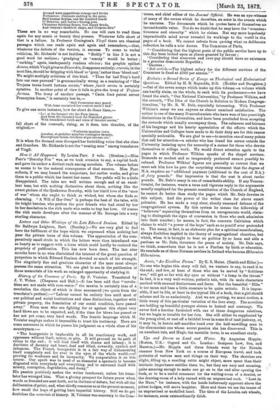Ecclesia : a Second Series of Essays on Theological and
Ecclesiastical Questions. Edited by H. R. Reynolds, D.D. (Hodder and Stoughton.) —Out of the seven essays which make up this volume —a volume which can hardly claim, on the whole, to rank with its predecessor—we have found the sixth, "Our National Universities," by Professor Wilkins, and the seventh, "The Idea of the Church in Relation to Modern Congrega- tionalism," by Mr. R. W. Dale, especially interesting. With Professor Wilkins's essay we can express an almost unmixed satisfaction. The author is one of the many Nonconformists who have won of late years high distinctions in the Universities, and have been precluded from accepting the rewards which usually accompany them. The calmness and fairness of his language and his hearty appreciation of the efforts which the Universities and Colleges have made to do their duty are for this reason specially noticeable. We are glad to see—to mention one of many points that call for attention—a scholar who has found his career outside the University insisting upon the necessity of a career for those who devote themselves to college work. We would direct attention again to the pages in which Professor Wilkins speaks of the chapel services. Demands so modest and so temperately preferred cannot possibly be refused. Professor Wilkins' figures are generally so correct that we must ask him how he gets the surprising statement that the degree of M.A. requires an "additional payment (additional to the cost of B.A.) of forty pounds." Our impression is that the cost is about twelve pounds. Mr. Dale's essay is one of remarkable ability. If any Noncon- formist, for instance, wants a terse and vigorous reply to the arguments usually employed for the present constitution of the Church of England, he cannot do better than study the pages which Mr. Dale devotes to this subject. And the power of the writer rises far above smart polemics. He has made a very clear, closely reasoned defence of the congregational system. By this system he means the fellowship of "believers" separating themselves from an unregenerate world, claim- ing to distinguish the signs of conversion in those who seek admission into their number ; he means, in fact, the concrete Calvinism which claims to wield "a power of the keys "such as no pontiff ever pretended to. The essay, in fact, is an elaborate plea for a spiritual sacerdotalism, always doubtless implied in the theory of congregational churches, but which, when it is brought to bear on politics by so keen and able a partizan as Mr. Dale, threatens the peace of society. Mr. Dale says, we think, somewhere that he is not a Puritan by birth or education. He reminds us of those Norman settlers in Ireland who became Hibernicis Hiberniores.


































 Previous page
Previous page